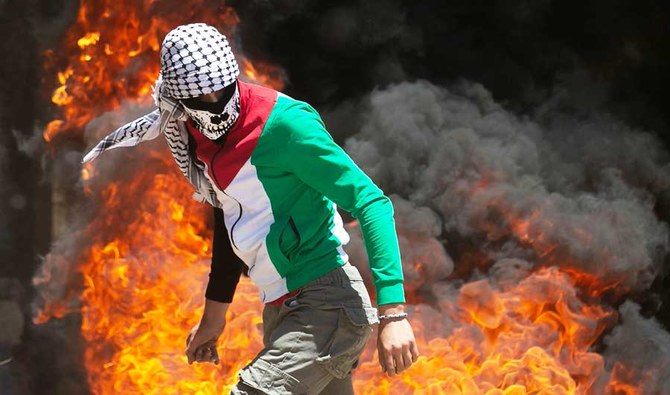AMMAN: Palestinian officials have welcomed the international community’s opposition to Israel’s West Bank annexation plans, but want the pressure to be permanent.
Israeli Prime Minister Benjamin Netanyahu has announced that he will annex parts of the West Bank, including the strategic Jordan Valley and dozens of Jewish settlements, in line with President Donald Trump's Middle East peace plan. Netanyahu has signaled he will begin moving forward with annexation next month.
The Trump plan envisions the creation of a Palestinian state, but on reduced territory and without meeting the key Palestinian demand of having its capital in east Jerusalem.
Hanan Ashrawi, a member of the PLO’s executive committee, said there needed to be a complete stop to the annexation policy.
“What we need is nullifying the policy of annexation and undoing earlier annexation both de facto and de jure,” he told Arab News.
Ashrawi said that Palestinians accepted the compromise of the two-state solution, but that the international community had yet to apply any serious pressure in that direction.
“Recognizing the Palestinian state is neither punishment for Israel or reward for Palestinians. They should have recognized Palestinians on the ‘67 borders long ago because that is the fulfillment of international law, the right of self-determination and their own people’s decisions in their respective parliaments.”
The PLO official argued that it had taken Palestinians a lot of effort and persuasion to reach this position, and warned that Israel might expect rewards if it walked back on its actions.
The question is not the size or location of the annexation but the very concept of annexation of someone else’s land, which is contrary to international law and an affront to the will of the international community which Israel so far has treated with utter contempt.
Hanan Ashrawi, Member of PLO executive committee
“There is another problem looming now, that Israel might reduce its annexation to settlement clusters or decide to postpone its actions and will want the world to reward them. The question is not the size or location of the annexation but the very concept of annexation of someone else’s land, which is contrary to international law and an affront to the will of the international community which Israel so far has treated with utter contempt.”
The escalation of opposition to Israel’s annexation plans have come from different quarters.
Germany, which sent its foreign minister to meet with leaders of Israel, Jordan and Palestine, has talked about the possibility of sanctions if the Israelis act unilaterally against international law.
The ambassador of the UAE to Washington, Yousef Al-Outaibi, wrote to the Israeli people in the Yediot Aharonot newspaper and recorded a video calling on them not to support annexation.
“For years, the UAE has been an unfailing supporter of Middle East peace,” he said. “We have consistently and actively opposed violence on all sides: We designated Hezbollah a terrorist organization, condemned Hamas incitement and denounced Israeli provocations. I was one of three Arab ambassadors in the East Room of the White House when President Trump unveiled his Middle East peace proposal in January.”
More recently Saudi Arabia’s Foreign Minister Prince Faisal bin Farhan, said the annexation plans were a “dangerous escalation” that threatened the peace process, while the World Council of Churches called on the EU to impose sanctions if Israel violated international law and annexed Palestinian territory.
Senior Fatah leader Jibril Rajoub said that Palestinians would fight annexation on all fronts, but that their opposition would be done in a principled way.
“We are approaching a turning point and we need to put aside all our differences and work on all fronts,” he told Arab News. “This must be a priority for all. We need to focus attention on stopping this grave violation of our rights. With all humility, we are ready to lead in a principled way. We want to apply the techniques of the popular struggle, to begin with protests and end with civil disobedience. We need to be unified, we want to change the reality and we want to live in our own state and we want the world to be with us.”
Rajoub, a leader of the Palestinian intifada, said there would be no rush to any action that could affect the global consensus that was forming in support of an independent Palestinian state. “We lived both intifadas and we have been struggling to end the Israeli occupation,” he added.
Some have said that it is possible that Netanyahu might opt to annex one or more of the settlements near the greenline that once separated Israel from the occupied West Bank.
Lawyer and human rights specialists Dalia Qumsieh told Arab News that Israel was expanding Highway Number 60, which connects West Jerusalem to the Gush Etzion settlement. It could be one of three settlements, in addition to Maaleh Adumim and Ariel, that Israel might annex as a first step starting July 1.
















